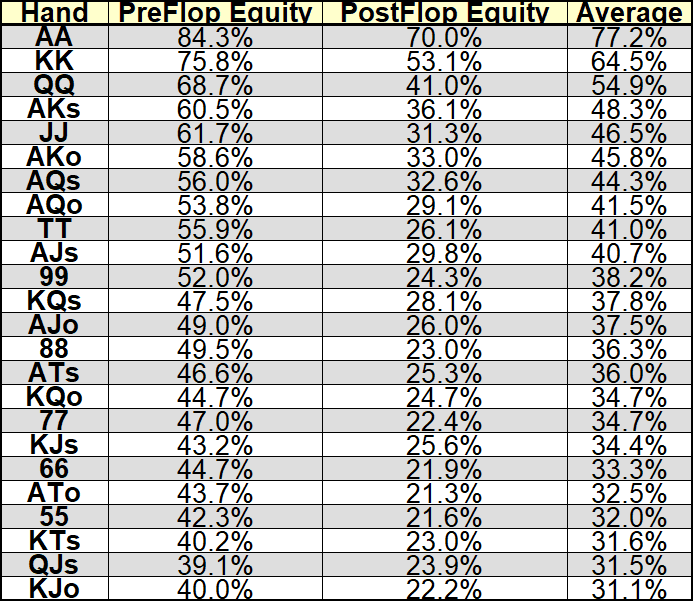Ranking Of Starting Poker Hands
Note: Not at the old Poker1 site. A version of this entry was originally published (1993) in Card Player magazine.
All this talk about hold ’em starting hands being only slightly better if suited than unsuited amuses me. The fact is, hold’em starting hands are a whole lot better if suited.

There is some disagreement amongst poker players as to which starting hands are the best, but few would dispute the value of the first of our three main groups, Aces and Kings. Group 1: AA, KK These two starting hands are the major players in hold’em. It’s not often you’ll get dealt Aces or Kings. In his famous Super / System, universally regarded as the bible of poker strategy books, poker legend Doyle Brunson devoted the third chapter to his list of 10 trouble hands – or starting hands that should only be played in certain situations if at all. And Ace Queen was at the top of that list for Texas Dolly. This article covers all poker hands, from hands in standard games of poker, to lowball, to playing with a variety of wild cards. Scroll to the end to find an in-depth ranking of suits for several countries, including many European countries and North American continental standards. This hand, which is also referred to as American Airlines is the best starting hand pre flop out of all potential starting hands in Texas Hold'Em Poker. With a hand like this, betting more aggressively is advised. The King, King starting hand is the second best starting hand pre-flop when it comes to Texas Hold'Em Poker.
I’ll bet I know how the misconception came about. A few players began to use computers to put a hand like
A♣ K♠


heads up against two random cards. It won about 65 percent of the time Then they changed the hand to
A♣ K♣

and ran that against two random cards. Now it won about 67 percent of the time, and they scratched their heads, muttering, “Hey, there’s hardly any difference!” Soon the “secret” was out that a suited starting hand was only slightly better than an unsuited one.
The real truth about suited cards. Unfortunately, this new conclusion was wrong. Here’s the problem. By measuring A-K against just one other random hand, you’re unwittingly selecting an example in which the suited cards are least likely to matter.
Remember: (1) With fewer foes, it’s less important that your starting hand be suited, because you’re more likely to win without a flush; (2) The larger your ranks, the less likely you are to need a flush, because big pairs often win; (3) With small ranks against many foes, a surprisingly large percentage of your profit comes from flushes.
Ranking Of Starting Poker Hands Free
An interesting example. To use a far-fetched example, say you decided to play recklessly. Your opponents held these hold’em starting hands: 7♣ 7♠, Q♣ J♣, K♥ 9♦, A♠ K♦.

Ranking Of Starting Poker Hands
If you entered with J-6 unsuited, you’d win just seven percent of the time. But make that J-6 suited and you’d win 12.5 percent of the time (still unprofitable, by the way). The final truth: the more opponents, the more valuable the suits; the lower your ranks, the more valuable the suits, and; on average having suited cards is more valuable than many skillful players think. — MC